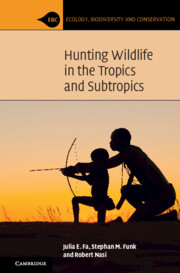Hunting Wildlife in the Tropics and Subtropics
The hunting of wild animals for their meat has been a crucial activity in the evolution of humans. It continues to be an essential source of food and a generator of income for millions of Indigenous and rural communities worldwide. Conservationists rightly fear that excessive hunting of many animal species will cause their demise, as has already happened throughout the Anthropocene. Many species of large mammals and birds have been decimated or annihilated due to overhunting by humans. If such pressures continue, many other species will meet the same fate. Equally, if the use of wildlife resources is to continue by those who depend on it, sustainable practices must be implemented. These communities need to remain or become custodians of the wildlife resources within their lands, for their own well-being as well as for biodiversity in general. This title is also available via Open Access on Cambridge Core.
Julia E. Fa is Professor of Biodiversity and Human Development at Manchester Metropolitan University and Senior Research Associate at the Center for International Forestry Research (CIFOR), Indonesia. Her research embraces ecology, anthropology and development issues. She leads projects in Europe, Africa and Latin America.
Stephan M. Funk is a passionate scientist leading the consultancy Nature Heritage, Jersey, to conserve biodiversity and natural heritage for our sustainable future. He is Head of Earth Sciences at Lemu, Chile. After training in ecology, genetics and biology, and environmental management, he has worked and lived around the world.
Robert Nasi is the Director General of the Center for International Forestry Research (CIFOR), Indonesia. He has lived and travelled extensively in Africa, Asia and the Pacific, undertaking research in ecology and management of tropical forests.

